Overcome procrastination by identifying your fight, flight and freeze responses, and then choosing to fight
"How procrastination is triggered: you have to do a stressful task. The task is stressful due to a combination of 2 components: performance and time pressure (deadline).
How you react: you can either fight the source of stress, flee it, or freeze.
How each reaction looks like:

source
Flight: put off the task for as long as possible, until the stress becomes unbearable (deadline approaching), and you're forced to either fight or freeze.


Fight: tackle the task head on, even with aggressiveness - the typical type A stereotype. When your mindset shifts to fight mode, completing the task becomes very motivating.

Freeze: bury your head figuratively in the sand. You let the deadline pass without doing anything about it, and accept your fate (given another chance, failing, getting fired). In nature, this is the animal playing dead, and letting the predator decide whether it lives or not.
Common simple scenarios
Fight: putting off tasks until the last minute, then you get a sudden boost of motivation and get it done really quickly. The very common "I work well under pressure" kind of procrastination.
Flight, followed by
Freeze: putting off tasks until the last minute, then realizing there's no point in putting in any more effort since there's no more time left to do a good job. This is usually a learned behaviour. After too many flight -> fights, eventually the last minute job isn't good enough, and maybe you failed, so now you don't even put up a fight anymore.
Fight: As soon as the stressor (task) comes, sustain fight mode until completion of the task, and it just ends there. Taking breaks isn't "flight", it's like taking a rest between boxing rounds; this is important, because fighting takes a lot of energy and it's not sustainable without respite. This is what a lot of us aspire to be.
Freeze: often associated with depression. The person just doesn't try anymore. Ignore bills, ignore e-mails, messages, ignore all the threats.
How to handle multiple important tasks
Imagine you're in a fight against multiple opponents.
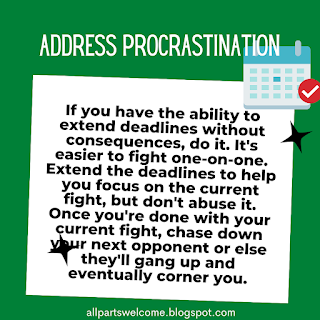
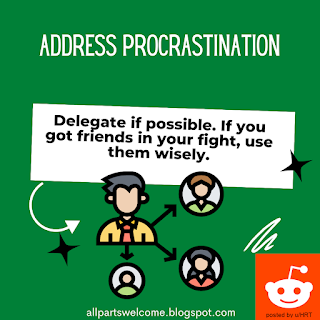
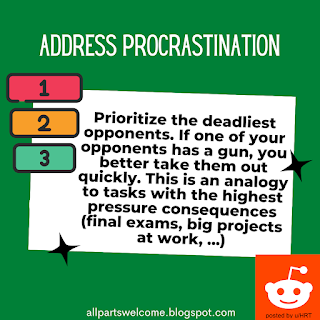
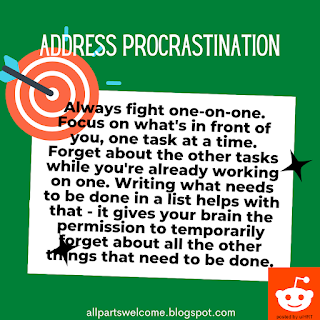
https://www.reddit.com/r/getdisciplined/comments/lktxp7/method_overcome_procrastination_by_identifying/
See also
https://medium.com/@tlxreed/how-our-ancient-brains-cause-procrastination-and-what-to-do-about-it-5061ed944ba0
How to handle multiple important tasks
Imagine you're in a fight against multiple opponents.

- If you have the ability to extend deadlines without consequences, do it. It's easier to fight one-on-one. Extend the deadlines to help you focus on the current fight, but don't abuse it. Once you're done with your current fight, chase down your next opponent or else they'll gang up and eventually corner you.

- Delegate if possible. If you got friends in your fight, use them wisely.

- Prioritize the deadliest opponents. If one of your opponents has a gun, you better take them out quickly. This is an analogy to tasks with the highest pressure consequences (final exams, big projects at work, ...)

- Always fight one-on-one. Focus on what's in front of you, one task at a time. Forget about the other tasks while you're already working on one. Writing what needs to be done in a list helps with that - it gives your brain the permission to temporarily forget about all the other things that need to be done."
https://www.reddit.com/r/getdisciplined/comments/lktxp7/method_overcome_procrastination_by_identifying/
See also
https://medium.com/@tlxreed/how-our-ancient-brains-cause-procrastination-and-what-to-do-about-it-5061ed944ba0

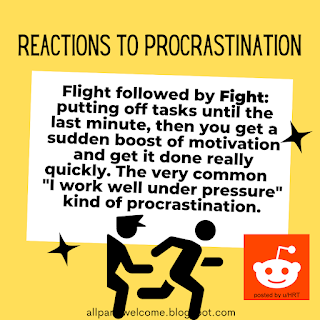


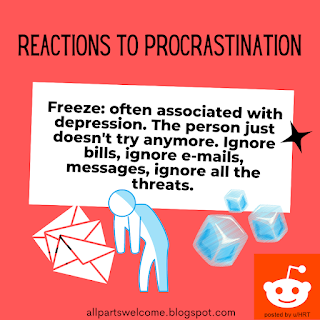



.png)











0 Comentarios